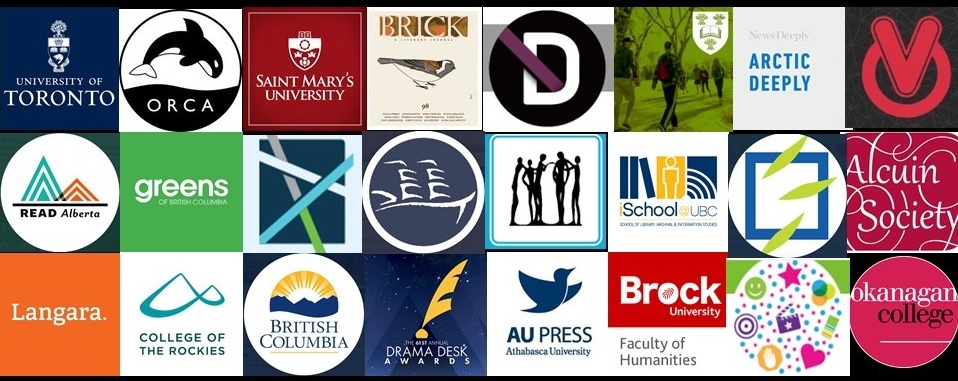Where Can UVic English Take You?

Sonja Pinto, MA 2022
- What is your job?
I work as an XML / Digital Content Editor for the King's Printer. The King's Printer is basically the publisher for the BC Government - we maintain the BC Laws website and work closely with the Legislative Assembly of British Columbia and other parts of government to make information publicly accessible and up to date. - What led you to pursue an interest in Digital Publications with XML and Freelance Writing?
I had always considered myself a strong communicator and a very detail-oriented person. I had originally thought that I would enjoy the autonomy and independence that Freelance Writing would give me, but I ended up missing the feeling of having a team and community with my work. I started looking for jobs in the public sector and happened to stumble on the posting for XML / Digital Content Editor at King's Printer. I had no idea that this type of work existed before that! - What does a typical professional day look like for you?
A lot of emails! It may sound mundane, but maintaining an organized inbox and keeping track of various tasks, workflow changes, and requests from colleagues does take up a lot of my time at work.
However, my workflow does vary quite a bit depending on the time of year. When the legislature is in session, I'm busy supporting their operations by doing things like getting bills online and updating the Orders of the Day.
Some tasks I find myself doing regularly are proofreading content, updating legislation using XML and HTML, and preparing content for digital publication. I use applications like Adobe InDesign, Photoshop, Acrobat, and Dreamweaver and Oxygen XML Editor on a daily basis. - What’s your favourite part of your work?
I've learned so much about typesetting, which has always been interesting to me, but I had never had any training in it. I am lucky to have a couple colleagues with a background in printing, and a few who were here when the King's Printer (then known as Queen's Printer) actually had a printing press in operation.
I've also been able to apply a lot of the random research interests that I developed as a student. For example, when I was a UVic student, a research and pedagogical interest of mine was digital accessibility. In my current role, I've been able to use some of that knowledge to make suggestions on how certain documents that we process can be better interpreted by screen readers.
Besides the work itself, I appreciate the flexibility to work from home on a regular basis, and the security and stability that comes from being in a unionized workplace! - How did UVic English help prepare you for this work?
Almost every bit of experience that I had when applying to this job came from my time in the UVic English program. I am a relatively recent UVic English grad (BA 2020, MA 2022), and had been extremely nervous about my transition into the workforce (mostly because I loved being a student and didn't want to leave UVic). In my six years at UVic, I actively sought out ways to get involved in the community so that I could find guidance and direction in my career. UVic English provides so many opportunities to gain experience and mentorship - even small events like department socials helped me find mentors and peers to support me. I was fortunate enough to be part of the Honours program, which challenged me immensely and gave me a space to "fail" safely and learn from my own mistakes.
Getting involved with The Albatross English Undergraduate Journal also connected me with peers at various points in their degrees, from whom I learned so, so much!
There are also specific UVic English courses I took that have helped me in a very practical way - Copy Editing (ENSH 302) is one that immediately jumps to mind. Practical Criticism (ENSH 301) also pushed me to hone my writing and verbal communication. There's also a handful of courses I took that were based in Special Collections, and those courses continue to be some of the most unique and formative learning experiences in my life so far.
I feel that my time as a Research Assistant for Digital Victorian Periodical Poetry especially prepared me for this work because of how many skills I learned as an RA that are directly applicable to my current role. It was through DVPP that I learned some basic XML and how to use and write project documentation. These skills not only helped me to land the job initially but also to be successful and grow in this role.
Working in Publishing
Before you found your favourite novel at your local bookstore, a team had to edit it, adjust its layout, design its cover, and market it to booksellers. I had the pleasure of speaking with three UVic English alumni who currently do this exciting behind-the-scenes work in the Canadian publishing industry.
 As a publicist at ZG Stories, alumna Ryann Anderson supports authors throughout the publishing process: “I communicate with media across the country, coordinate interviews, plan book launches and events, design ads, write for social media, and work with a lot of bookstagrammers to share our titles online.” Anderson graduated from UVic’s English Honours program with a minor in Professional Communication in 2019: “I’m very thankful for all the research, reading, and writing that I was able to complete during my time at UVic that honed the skills I use in my professional career.” Ryann says that what she likes best about working as a publicist is “helping authors shine. I come on to a project when writers are in a really vulnerable place—they’re getting ready to send their book out into the world for reviewers and readers. I’m there to support them through that time and help tell the world why their work deserves to be read.”
As a publicist at ZG Stories, alumna Ryann Anderson supports authors throughout the publishing process: “I communicate with media across the country, coordinate interviews, plan book launches and events, design ads, write for social media, and work with a lot of bookstagrammers to share our titles online.” Anderson graduated from UVic’s English Honours program with a minor in Professional Communication in 2019: “I’m very thankful for all the research, reading, and writing that I was able to complete during my time at UVic that honed the skills I use in my professional career.” Ryann says that what she likes best about working as a publicist is “helping authors shine. I come on to a project when writers are in a really vulnerable place—they’re getting ready to send their book out into the world for reviewers and readers. I’m there to support them through that time and help tell the world why their work deserves to be read.”
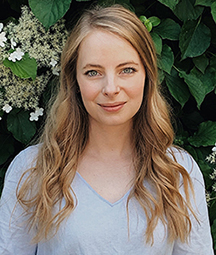 Karyn Wisselink (BA 2015) also found her calling in the marketing side of publishing. The marketing and production coordinator at Athabasca University Press, an open access scholarly press based in Edmonton, Alberta, Karyn says, “the skills I acquired at UVic were essential for getting my first job in publishing…. Distilling an entire book into an essay requires the same skills as writing jacket and catalogue copy.” As a key member of a busy academic press, she isn’t limited to working with print books—“AU Press publishes all their books in both print and digital formats so I get to work on things like alt-text for images and additional digital resources for the free books on the Press’s reading platform.” Karyn is also the social media manager for Read Alberta, a website that celebrates the Alberta book community.
Karyn Wisselink (BA 2015) also found her calling in the marketing side of publishing. The marketing and production coordinator at Athabasca University Press, an open access scholarly press based in Edmonton, Alberta, Karyn says, “the skills I acquired at UVic were essential for getting my first job in publishing…. Distilling an entire book into an essay requires the same skills as writing jacket and catalogue copy.” As a key member of a busy academic press, she isn’t limited to working with print books—“AU Press publishes all their books in both print and digital formats so I get to work on things like alt-text for images and additional digital resources for the free books on the Press’s reading platform.” Karyn is also the social media manager for Read Alberta, a website that celebrates the Alberta book community.
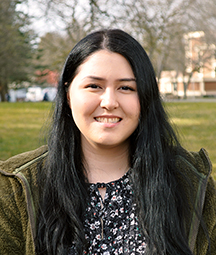 Erin Chan (BA 2019), who double majored in English and Pacific and Asian Studies, explains how UVic English prepared her to work in publishing: “So many of the skills I developed over the course of my English degree have helped me immensely in my publishing pursuits thus far—from being able to approach texts and perform skills in close reading and critical analysis to communicating effectively through advanced writing and editing competencies.” Erin is currently completing her Master of Publishing at Simon Fraser University, where she also works as a teaching assistant. As a TA, she supports students as they work through “various book design projects—one of which includes conceptualizing and designing a print illustrated book based on the un/settled art installation by Otoniya J. Okot Bitek and Chantal Gibson at SFU’s Belzberg Library.” Erin also recently completed an internship with independent book publisher Arsenal Pulp Press; “I loved working with such a passionate team and seeing the behind-the-scenes of the amazing and important books they are publishing.”
Erin Chan (BA 2019), who double majored in English and Pacific and Asian Studies, explains how UVic English prepared her to work in publishing: “So many of the skills I developed over the course of my English degree have helped me immensely in my publishing pursuits thus far—from being able to approach texts and perform skills in close reading and critical analysis to communicating effectively through advanced writing and editing competencies.” Erin is currently completing her Master of Publishing at Simon Fraser University, where she also works as a teaching assistant. As a TA, she supports students as they work through “various book design projects—one of which includes conceptualizing and designing a print illustrated book based on the un/settled art installation by Otoniya J. Okot Bitek and Chantal Gibson at SFU’s Belzberg Library.” Erin also recently completed an internship with independent book publisher Arsenal Pulp Press; “I loved working with such a passionate team and seeing the behind-the-scenes of the amazing and important books they are publishing.”
Beyond their English courses, Karyn and Erin honed their editorial skills by volunteering with UVic’s English undergraduate journal, The Albatross. Additionally, Ryann found hands-on experience through marketing and communications co-ops, while Karyn gained insight into the literary publishing world through a Work Study position at The Malahat Review. Erin completed a work term at a local arts non-profit through UVic’s Work Experience Program, honing her marketing and communications skills through outreach.
Karyn, Ryann, and Erin are just a few of the UVic English alumni working in the exciting world of publishing. Read their full interviews here, and be sure to check back to this page to find out where else a UVic English degree can take you!
By Anne Hung
Working in Libraries, Archives, and Museums
A love of books and cultural history has taken four UVic English alumni to positions in post-secondary and public libraries, conservation, and museums. For these alumni, work in the diverse field of library, archive, and museum studies provides rewarding opportunities to share knowledge and connect with a wide range of audiences and learners.
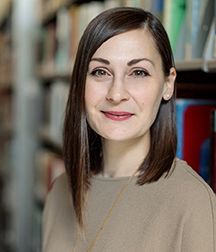 Lindsay Tripp (BA 2006) works at snəw̓eyəɬ leləm̓ Langara College as a reference and instruction librarian and cites her “passion for public service, academic research, and education” as inspiring her to pursue library and archival studies. As a librarian liaison for six departments, Lindsay has diverse responsibilities, from consulting with students about research to responding to copyright queries. Lindsay credits UVic English with teaching her how to “read closely, think critically, and communicate complex ideas clearly and concisely” and how to “cultivate a strong narrative voice”—all skills she regards as essential for her job. Lindsay also shared her favourite part of her work: “As a first-generation university graduate, I’m passionate about creating accessible pathways to higher education.… As lead for the college’s open education committee and community of practice, I facilitate initiatives that promote affordable and high-quality education for all. It’s a privilege to have a job that fills your cup and I’m grateful to UVic English for helping me find my way here.”
Lindsay Tripp (BA 2006) works at snəw̓eyəɬ leləm̓ Langara College as a reference and instruction librarian and cites her “passion for public service, academic research, and education” as inspiring her to pursue library and archival studies. As a librarian liaison for six departments, Lindsay has diverse responsibilities, from consulting with students about research to responding to copyright queries. Lindsay credits UVic English with teaching her how to “read closely, think critically, and communicate complex ideas clearly and concisely” and how to “cultivate a strong narrative voice”—all skills she regards as essential for her job. Lindsay also shared her favourite part of her work: “As a first-generation university graduate, I’m passionate about creating accessible pathways to higher education.… As lead for the college’s open education committee and community of practice, I facilitate initiatives that promote affordable and high-quality education for all. It’s a privilege to have a job that fills your cup and I’m grateful to UVic English for helping me find my way here.”
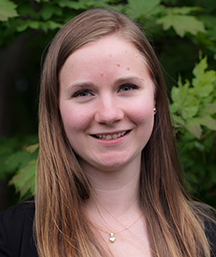 Elizabeth Bassett (MA 2016) recently completed her dual program in Library and Archival studies at UBC (MASLIS) and has worked a variety of student contract jobs in the field: “I’ve worked as Archives Assistant at the Vancouver Art Gallery Library and Archives, as Digital Access Assistant at the University of Victoria Libraries Special Collections and University Archives, and as a research assistant for Dr. Jennifer Douglas’s project on grief work in archives.” Elizabeth has just begun a position as Digital Access Librarian at the West Vancouver Memorial Library, where she will design and teach technology workshops for children and adults. During her MA in English, she was exposed to archival studies through UVic’s co-op program and honed helpful skills by “working as a teaching assistant for UVic English (instructional skills are highly relevant to many jobs in the field).” Elizabeth’s work in libraries and archives fulfils her passion for learning: “Libraries and archives are ... truly spaces of life-long learning, and I love going to work knowing that my job requires that I constantly challenge myself to learn something new.”
Elizabeth Bassett (MA 2016) recently completed her dual program in Library and Archival studies at UBC (MASLIS) and has worked a variety of student contract jobs in the field: “I’ve worked as Archives Assistant at the Vancouver Art Gallery Library and Archives, as Digital Access Assistant at the University of Victoria Libraries Special Collections and University Archives, and as a research assistant for Dr. Jennifer Douglas’s project on grief work in archives.” Elizabeth has just begun a position as Digital Access Librarian at the West Vancouver Memorial Library, where she will design and teach technology workshops for children and adults. During her MA in English, she was exposed to archival studies through UVic’s co-op program and honed helpful skills by “working as a teaching assistant for UVic English (instructional skills are highly relevant to many jobs in the field).” Elizabeth’s work in libraries and archives fulfils her passion for learning: “Libraries and archives are ... truly spaces of life-long learning, and I love going to work knowing that my job requires that I constantly challenge myself to learn something new.”
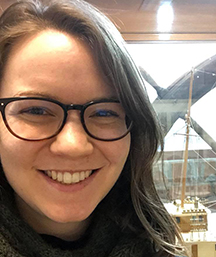 Brittany Vis (BA 2012) is Executive Director at the Maritime Museum of BC, but she started working in the Museum collections as an archivist. Inspired to pursue archival studies because of her love of reading and stories, she also “loved the idea of always being surrounded by books and historic records. Of course, my role with the museum has evolved and I spend less time with the collection than I used to, but that’s what led me to where I am today.” As Executive Director, Brittany oversees all of the Museum’s operations: “I’ll spend time working on operational tasks, developing museum policies and procedures, working with various museum committees on specific tasks, writing grants, overseeing our finances, and planning for future activities.” Brittany’s early experiences in UVic English remain valuable in her current position: “UVic English gave me skills such as writing, editing, and critical thinking, which I use on a daily basis.”
Brittany Vis (BA 2012) is Executive Director at the Maritime Museum of BC, but she started working in the Museum collections as an archivist. Inspired to pursue archival studies because of her love of reading and stories, she also “loved the idea of always being surrounded by books and historic records. Of course, my role with the museum has evolved and I spend less time with the collection than I used to, but that’s what led me to where I am today.” As Executive Director, Brittany oversees all of the Museum’s operations: “I’ll spend time working on operational tasks, developing museum policies and procedures, working with various museum committees on specific tasks, writing grants, overseeing our finances, and planning for future activities.” Brittany’s early experiences in UVic English remain valuable in her current position: “UVic English gave me skills such as writing, editing, and critical thinking, which I use on a daily basis.”
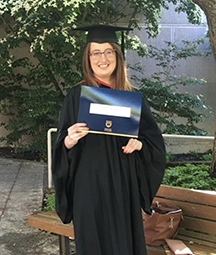 Emily Scott has taken her love of cultural heritage, developed during her English studies, into her work as an Archivist and Curator for the BC Conservation Officer Service through the Youth Employment Program, where she is documenting over 100 years of historical objects and creating a display. Emily completed her BA (2016) and MA (2018) in English at UVic and was exposed to archives through classes in UVic Special Collections: “I was interested in cultural heritage in the sense that culture and historical knowledge could be passed on through generations. I loved exploring this through Indigenous literature and multicultural stories. Once I realized that I could adapt my love of Special Collections and cultural history through objects, I decided archival studies and museums were the place for me.” Emily singles out an undergraduate course in modernism for sparking her interest in UVic English: “When I first started studying at UVic I wasn't declared yet, but it was a Modernist literature class that got me interested in majoring in English. I was able to take my passion for reading and turn it into a professional qualification. The feedback and support that I got from the department helped me develop my writing skills. And … when it was time to move on from UVic, I gained support from those same professors when they helped me with my applications for studying abroad in Aberdeen, Scotland. UVic English left a great impact on me.”
Emily Scott has taken her love of cultural heritage, developed during her English studies, into her work as an Archivist and Curator for the BC Conservation Officer Service through the Youth Employment Program, where she is documenting over 100 years of historical objects and creating a display. Emily completed her BA (2016) and MA (2018) in English at UVic and was exposed to archives through classes in UVic Special Collections: “I was interested in cultural heritage in the sense that culture and historical knowledge could be passed on through generations. I loved exploring this through Indigenous literature and multicultural stories. Once I realized that I could adapt my love of Special Collections and cultural history through objects, I decided archival studies and museums were the place for me.” Emily singles out an undergraduate course in modernism for sparking her interest in UVic English: “When I first started studying at UVic I wasn't declared yet, but it was a Modernist literature class that got me interested in majoring in English. I was able to take my passion for reading and turn it into a professional qualification. The feedback and support that I got from the department helped me develop my writing skills. And … when it was time to move on from UVic, I gained support from those same professors when they helped me with my applications for studying abroad in Aberdeen, Scotland. UVic English left a great impact on me.”
If you are interested in learning more about the wide range of work that can stem from pursuing library and archival studies, read the full interviews with these UVic alumni here. If you think archival studies may be for you, check out UVic’s Special Collections as well as UVic English courses that take place in Special Collections, including ENGL 479: Victorian & Edwardian Children’s Fiction and ENGL 481: In the Archives.
By Madison George-Berlet
Working in Communications
Communications work offers a wide range of experiences, such as collaborating with clients, devising marketing strategies, and creating digital design. Three UVic English alumni provide insight on the communications work they do within their own businesses.
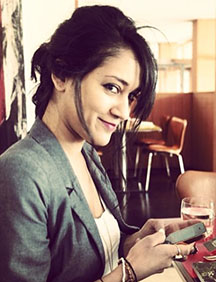 Sonu Purhar (MA 2010) is a marketing consultant at her company, Crafted INK Consulting Inc., where her tasks “involve drafting strategic plans, writing news releases, attending/organizing a film-related event, or editing a report.” After graduation, Sonu’s network led her to a position at Tourism Vancouver, where she worked in corporate communications and international and trade media before launching Crafted INK Consulting Inc. Sonu’s various clients include economic agencies, tourism bureaus, PR companies, and film studios. She enjoys this range of work that “allows her to switch from Hollywood films to economic reports.” UVic English helped her develop research skills that are essential to a job in which clients work in many different industries. Sonu thanks UVic English for giving her the skills to start her company: “the Masters program taught me to work against extremely tight deadlines, to stay motivated and focused, and to develop an internal drive to embrace complex projects.”
Sonu Purhar (MA 2010) is a marketing consultant at her company, Crafted INK Consulting Inc., where her tasks “involve drafting strategic plans, writing news releases, attending/organizing a film-related event, or editing a report.” After graduation, Sonu’s network led her to a position at Tourism Vancouver, where she worked in corporate communications and international and trade media before launching Crafted INK Consulting Inc. Sonu’s various clients include economic agencies, tourism bureaus, PR companies, and film studios. She enjoys this range of work that “allows her to switch from Hollywood films to economic reports.” UVic English helped her develop research skills that are essential to a job in which clients work in many different industries. Sonu thanks UVic English for giving her the skills to start her company: “the Masters program taught me to work against extremely tight deadlines, to stay motivated and focused, and to develop an internal drive to embrace complex projects.”
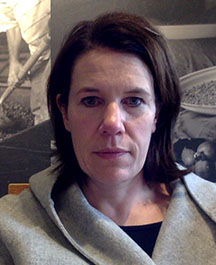 Susan Kerschbaumer (MA 1993) has also learned to work tight deadlines while running her own communications firm. Taking her Masters degree required self-directed study, which prepared her for self-employment after working for newspapers, the arts, and CHUM Television. Susan’s workday “might include coming up with a strategy as to how certain information should be communicated, actual writing (which could be web copy, a news release, a report or any number of other things), or meeting with clients.” She also carries the firm’s administrative tasks: “looking for new work, submitting proposals, and invoicing, for example.” Susan uses the analytical skills she learned from UVic English to communicate information through writing. In addition to her English MA, Susan holds a Bachelor of Business Administration from Simon Fraser University.
Susan Kerschbaumer (MA 1993) has also learned to work tight deadlines while running her own communications firm. Taking her Masters degree required self-directed study, which prepared her for self-employment after working for newspapers, the arts, and CHUM Television. Susan’s workday “might include coming up with a strategy as to how certain information should be communicated, actual writing (which could be web copy, a news release, a report or any number of other things), or meeting with clients.” She also carries the firm’s administrative tasks: “looking for new work, submitting proposals, and invoicing, for example.” Susan uses the analytical skills she learned from UVic English to communicate information through writing. In addition to her English MA, Susan holds a Bachelor of Business Administration from Simon Fraser University.
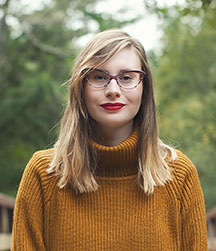 Emma Fanning (BA 2017) owns Little Fox Design, a green graphic-design business where she “work[s] primarily with sustainable businesses to translate their sustainable commitments through their visuals and packaging.” After Emma gained experience as an in-house designer, she became interested in founding a business for sustainable graphic design. Little Fox’s recent work has involved working with alternative protein and meat companies: “it’s fascinating learning about the amazing sustainable innovations happening in the food industry and to be behind the scenes working with the next generation of food.” Emma gained research skills from UVic English: “many of our clients are coming to us for complicated, technical sustainable analyses of packaging materials and sustainability practices. The long papers I had to research and write in my upper-year English courses and Professional Communications courses were invaluable for teaching me how to research and effectively vet sources.”
Emma Fanning (BA 2017) owns Little Fox Design, a green graphic-design business where she “work[s] primarily with sustainable businesses to translate their sustainable commitments through their visuals and packaging.” After Emma gained experience as an in-house designer, she became interested in founding a business for sustainable graphic design. Little Fox’s recent work has involved working with alternative protein and meat companies: “it’s fascinating learning about the amazing sustainable innovations happening in the food industry and to be behind the scenes working with the next generation of food.” Emma gained research skills from UVic English: “many of our clients are coming to us for complicated, technical sustainable analyses of packaging materials and sustainability practices. The long papers I had to research and write in my upper-year English courses and Professional Communications courses were invaluable for teaching me how to research and effectively vet sources.”
Read more about Sonu’s, Susan’s, and Emma’s careers here!
By Colleen Bidner
Working in Editing (Print and Video)
UVic English courses may interest students in professional editing. These four alumni have found exciting editing careers in journalism, literature, and video.
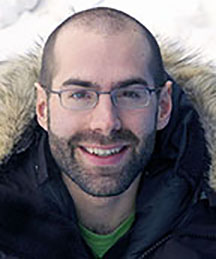 John Thompson (BA Hons, 2004) worked as a web editor for Nunatsiaq News and is currently a communications analyst for the Yukon government. As a web editor, John sought engaging stories for Nunatsiaq News to post online. Articles may have needed structural revision or quick copy edits. John says, “It’s especially satisfying to help a reporter who’s working on a story you know is going to resonate with readers and be able to shepherd that piece towards publication in a way that makes it as clear as possible.” Majoring in English helped John with “quickly synthesizing information and presenting my thoughts in a clear, organized way.” In addition to studying copy editing on his journey towards a Professional Writing minor, John worked for community papers through UVic’s Co-op and Career Program and edited for the Martlet
John Thompson (BA Hons, 2004) worked as a web editor for Nunatsiaq News and is currently a communications analyst for the Yukon government. As a web editor, John sought engaging stories for Nunatsiaq News to post online. Articles may have needed structural revision or quick copy edits. John says, “It’s especially satisfying to help a reporter who’s working on a story you know is going to resonate with readers and be able to shepherd that piece towards publication in a way that makes it as clear as possible.” Majoring in English helped John with “quickly synthesizing information and presenting my thoughts in a clear, organized way.” In addition to studying copy editing on his journey towards a Professional Writing minor, John worked for community papers through UVic’s Co-op and Career Program and edited for the Martlet
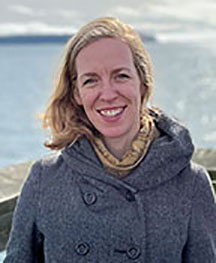 Liz Johnston (BA 2008) is a freelance editor and is on Brick’s editorial board. Liz provides a variety of editorial services, including proofreading, substantive edits, and manuscript evaluations. She also meets with clients, updates her website and social media presence, and participates in webinars and workshops. “The breadth of works I studied at UVic helps me pick up on and understand references and allusions I come across in material I’m editing,” Liz says. “The close-reading skills I honed at UVic help me appreciate the subtler things a writer might be trying to do.” While working for Victorian Review through the Work Study Program, Liz read Amy Einsohn’s Copyeditor’s Handbook.
Liz Johnston (BA 2008) is a freelance editor and is on Brick’s editorial board. Liz provides a variety of editorial services, including proofreading, substantive edits, and manuscript evaluations. She also meets with clients, updates her website and social media presence, and participates in webinars and workshops. “The breadth of works I studied at UVic helps me pick up on and understand references and allusions I come across in material I’m editing,” Liz says. “The close-reading skills I honed at UVic help me appreciate the subtler things a writer might be trying to do.” While working for Victorian Review through the Work Study Program, Liz read Amy Einsohn’s Copyeditor’s Handbook.
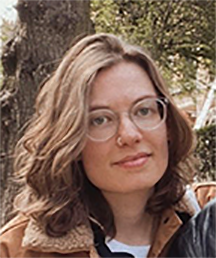 Kate Fry (BA Hons, 2020) co-edited Growing Up Trans with Dr. Lindsay Herriot through the Gender Generations Project. This anthology contains art and written work by transgender youth who share their stories. Before editing the anthology, Kate had an interest in queer narrative perspectives. “Both Dr. Herriot and myself are cisgender adult women; thus, doing something more like traditional editing work to the youth’s stories would be antithetical to the project’s whole ethos,” she says. “While Dr. Herriot and I tried to leave as little of a mark as possible on the book, we did still need to write the introduction, key concepts, discussion questions, and so forth.” ENGL 310: Practical Criticism developed Kate’s essay-writing skills, which she applied to the anthology.
Kate Fry (BA Hons, 2020) co-edited Growing Up Trans with Dr. Lindsay Herriot through the Gender Generations Project. This anthology contains art and written work by transgender youth who share their stories. Before editing the anthology, Kate had an interest in queer narrative perspectives. “Both Dr. Herriot and myself are cisgender adult women; thus, doing something more like traditional editing work to the youth’s stories would be antithetical to the project’s whole ethos,” she says. “While Dr. Herriot and I tried to leave as little of a mark as possible on the book, we did still need to write the introduction, key concepts, discussion questions, and so forth.” ENGL 310: Practical Criticism developed Kate’s essay-writing skills, which she applied to the anthology.
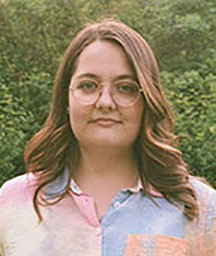 Sonya Chwyl (BA Hons, 2016) edits documentary films: “a lot of editing is planning, sorting, and selecting footage, which makes up the initial stage of a project. … Once that’s done, I'll spend my days assembling everything into a rough draft, then cutting it down and fine-tuning based on the feedback I get from the director.” While UVic English does not offer courses on video editing technicalities, Sonya’s degree strengthened her skills in communicating suggestions for revision and analyzing film structure. She notes that “with documentary, there are a million different ways you could potentially cut something, and none of them are necessarily right or wrong. A lot of it is just up to you and your instincts as an editor. … Creatively it gives you so much room to learn, grow, and try things.” Experience in independent film, freelance video editing, and communications led Sonya to her post-production work.
Sonya Chwyl (BA Hons, 2016) edits documentary films: “a lot of editing is planning, sorting, and selecting footage, which makes up the initial stage of a project. … Once that’s done, I'll spend my days assembling everything into a rough draft, then cutting it down and fine-tuning based on the feedback I get from the director.” While UVic English does not offer courses on video editing technicalities, Sonya’s degree strengthened her skills in communicating suggestions for revision and analyzing film structure. She notes that “with documentary, there are a million different ways you could potentially cut something, and none of them are necessarily right or wrong. A lot of it is just up to you and your instincts as an editor. … Creatively it gives you so much room to learn, grow, and try things.” Experience in independent film, freelance video editing, and communications led Sonya to her post-production work.
These alumni’s full interviews can be read here!
By Colleen Bidner
Book designer, web developer, digital librarian, lawyer, social media manager, communication coordinator, publicist, professor, archivist, museum director, teacher, filmmaker, freelance writer, editor: these are just some of the exciting careers that UVic English alumni are pursuing.
In this series about alumni and student successes, current English undergraduates and Communication Assistants Madison George-Berlet and Anne Hung share stories about where UVic English can take you as well as short interviews with alumni about their professional careers, current jobs, and volunteer experiences. From “Working in Publishing” and “Working in Libraries & Collections” to “Working with Local Businesses,” “Working in Education,” and “Working in Creative Communications,” these stories of alumni and student success will inspire you to contemplate where UVic English can take you!
If you have an alumni success story to share with us, we would love to hear from you! Please get in touch with us on email at englreception@uvic.ca or on Twitter @UVicEnglish.

